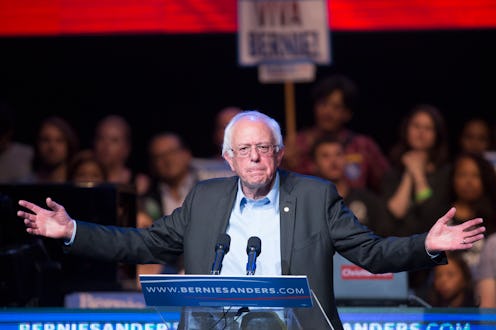News
Sanders Just Got His 2nd Congressional Endorsement
The day before the first Democratic primary debate, Vermont Sen. Bernie Sanders received his second congressional endorsement from Rep. Keith Ellison, the co-chairman of the Congressional Progressive Caucus. "Bernie and I have stood together on progressive values for years,” Ellison stated to MSNBC on Monday. “Bernie was a founder of the Congressional Progressive Caucus, and as one of the current co-chairs, we have a shared desire to help Americans who are struggling to get by.”
And Sanders received his first congressional endorsement just last week, from Rep. Raul Grijalva, the other co-chairman of the Congressional Progressive Caucus. Both cited Sanders' unique message and his powerful effect on voter awareness and participation. However, for all of the tremendous crowds Sanders is consistently drawing, his impressive surges in the polls, and the many celebrities and millennials who are feeling the "Bern," Sanders is now backed by just two congressmen to Democratic frontrunner Hillary Clinton's 119.
As the longest-serving independent U.S. senator, Sanders has been struggling to garner support from establishment Democratic officials. Sanders may have the endorsements of Congressional Progressive Caucus co-chairmen Ellison and Grijalva, but 26 members of the Caucus were backing Clinton as of July, according to The Hill. But what role do congressional endorsements play in presidential elections?
National elections aren't generally decided by the House of Representatives. Historically, only one presidential election has been determined by the House of Representatives: the 1824 deadlock between John Quincy Adams and Andrew Jackson. As dictated by the Constitution, when no candidate can achieve a majority in terms of electoral votes, the presidential election is essentially handed to the House of Representatives. However, Sanders and Clinton aren't currently squaring off for the presidency, but for the Democratic party nomination. It would be somewhat safe to assume that whether Clinton or Sanders wins the party's nomination, if they nor their Republican opponent was able to win a majority of electoral votes, Democratic representatives would vote in favor of the Democratic nominee, regardless of where their endorsement was prior.
The House of Representatives itself has little to do with how a candidate is selected as the party's presidential nominee. Thus, it's not immediately concerning for Sanders that his campaign has attracted the support of only two congressmen. Rather, he should focus on maintaining and bolstering his appeal to voters, who will ultimately determine the Democratic party's nominee through state caucuses and primaries.
History would support that candidates who receive more congressional endorsements proceed to win their party's nomination. Most recently, in 2008, then-Sen. Obama had nearly triple Clinton's congressional endorsements, while in 2012, Republican nominee Mitt Romney earned significantly more congressional endorsements than his closest competitor, Rick Santorum. To an extent, their successes could be attributed to the ability of House members to influence the voters of their districts in favor of the candidate they support.
However, the formula for a successful campaign has changed a little since recent presidential elections. Bernie Sanders has arguably revealed the power of grassroots appeal and the revival of the notoriously disillusioned millennial voting pool. Sanders' appeal appears to be strongly rooted in how his standalone character dramatically contrasts with those of the establishment politicians whom younger voters are arguably disillusioned with, and have come to distrust. To the growing numbers of Americans who are feeling the "Bern," that Sanders is delivering his message to them before special interest groups, before even congressmen, is a strong reflection of his sole dedication to the American people.
Simultaneously, social media now arguably commands a stronger role in this election season than it ever has previously. Political awareness is primarily shaped by what potential voters encounter in their Facebook or Twitter newsfeeds from popular news platforms, or based on what friends share, as opposed to what they hear directly from their representatives on TV or through the radio. Former secretary of labor and current University of California, Berkeley professor Robert Reich wrote in a Facebook status, "My students at Berkeley — like students I meet all over the country — tell me they don’t watch television anymore, and few listen to the radio. Instead, they watch YouTube, Facebook, Netflix, and iTunes, and they listen to podcasts and their favorite songs. What does this have to with American politics? Everything." And indeed, as Reich went on to point out, Sanders and his populist message have consistently been dominating social media.
Congressional endorsements from progressive leaders certainly couldn't hurt Sanders' cause at its core. However, his grassroots appeal to young Americans and ability to spark their political passions is rooted in the spread of his populist message and character, which have little connection to which major politicians or establishment figures are endorsing him. When asked if he was concerned by the Vermont Senator's current lack of endorsements, Ellison, Sanders' latest congressional endorsement, put it best: "I don’t think it’s a problem. What matters is that he is connecting to the American people and talking about issues that matter to them the most."
